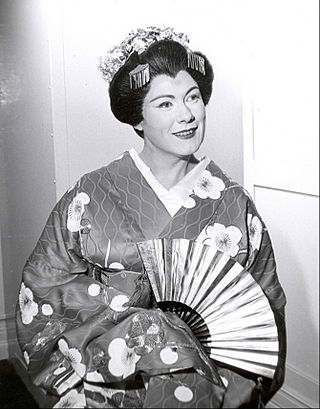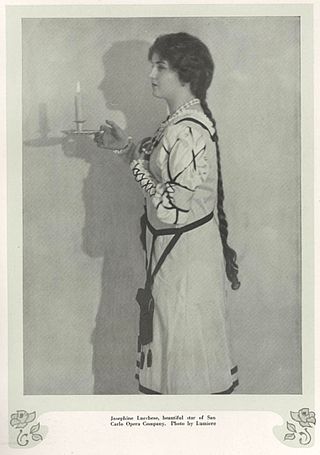
Renata Tebaldi was an Italian lirico-spinto soprano popular in the post-war period, and especially prominent as one of the stars of La Scala, San Carlo and, especially, the Metropolitan Opera. Often considered among the great opera singers of the 20th century, she focused primarily on the verismo roles of the lyric and dramatic repertoires. Italian conductor Arturo Toscanini called her voice "la voce d'angelo", and La Scala music director Riccardo Muti called her "one of the greatest performers with one of the most extraordinary voices in the field of opera."

Anna Moffo was an American opera singer, television personality, and actress. One of the leading lyric-coloratura sopranos of her generation, she possessed a warm and radiant voice of considerable range and agility. Noted for her physical beauty, she was nicknamed "La Bellissima".

Gino Vanelli was an Italian operatic baritone who had an active international career from 1917 until his retirement in 1955. He made several recordings for HMV and Columbia Records, including complete recordings of the operas La boheme, Pagliacci, and Madama Butterfly.

Ettore Bastianini was an Italian operatic baritone who was particularly associated with the operas of the bel canto tradition.

Maria Antonietta Stella was an Italian operatic soprano, and one of the most prominent Italian spinto sopranos of the 1950s and 1960s. She made her debut in Spoleto in 1950, as Leonora in Verdi's Il trovatore, a year later at Rome Opera, as Leonora in La forza del destino, in 1954 at La Scala in Milan, as Desdemona in Otello, in 1955 at the Royal Opera House in London as Aida, and in 1956 at the Metropolitan Opera in New York City, in the same role.

Herva Nelli was an Italian-American operatic soprano.
Tulsa Opera is an American opera company based in Tulsa, Oklahoma.

Giuseppe Valdengo was an Italian operatic baritone. Opera News said that, "Although his timbre lacked the innate beauty of some of his baritone contemporaries, Valdengo's performances were invariably satisfying — bold and assured in attack but scrupulously musical."

Gino Marinuzzi was an Italian conductor and composer, particularly associated with the operas of Wagner and the Italian repertory.
Antonio Magini-Coletti was a leading Italian baritone who had a prolific career in Europe and the United States during the late 19th century and the early part of the 20th century. A versatile artist, he appeared in several opera world premieres but was particularly associated with the works of Giuseppe Verdi, Richard Wagner and the verismo composers. He was also an accomplished exponent of the bel canto repertoire.

The Philadelphia Grand Opera Company was the name of four different American opera companies active at the Academy of Music in Philadelphia, Pennsylvania during the twentieth century. The last and best known of the four was founded in November 1954 with the merger of the Philadelphia Civic Grand Opera Company and the Philadelphia La Scala Opera Company. That company in turn merged with the Philadelphia Lyric Opera Company in 1975 to form the Opera Company of Philadelphia. Of the three earlier companies, only one lasted beyond one season; a company founded in 1926 which later became associated with the Curtis Institute of Music in 1929. That company closed its doors in 1932 due to financial reasons during the Great Depression.

The Philadelphia Civic Grand Opera Company (PCGOC) was an American opera company located in Philadelphia, Pennsylvania that was actively performing at the Academy of Music between 1950 and 1955. Fausta Cleva served as the company's first General Director and conductor, and Chevalier L. Jackson was the governing board's first president. The company's first performance was of Camille Saint-Saëns's Samson et Dalila on January 24, 1950 with Giovanni Martinelli as Samson, Blanche Thebom as Dalila, Martial Singher as The High Priest of Dagon, and John Lawler as Abimélech. Other operas presented that season were Cavalleria rusticana, L'amico Fritz, and Carmen.
Raffaele Mirate was a celebrated Italian operatic tenor who had an active career from the 1830s through the 1860s. Known for his intelligent phrasing and bright and powerful vocal timbre, he was regarded as an outstanding interpreter of the tenor roles in the early and middle period operas of Giuseppe Verdi. He notably created the role of the Duke of Mantua in the world premiere of Verdi's Rigoletto in 1851. He was also a highly regarded interpreter of bel canto roles, excelling in the operas of Vincenzo Bellini, Gaetano Donizetti, and Gioachino Rossini.
Carlo Moresco was an American conductor, composer, violinist, and stage director of Italian birth. He was one of the most important opera conductors in the city of Philadelphia during the 20th century, working for multiple opera companies in that city. He also held conducting posts with companies in Connecticut and at the Tulsa Opera.

Carlo Meliciani was an Italian operatic baritone who had an active international career from the mid-1950s through the late 1970s. From 1959 to 1979 he was on the roster of singers at La Scala in Milan. Although he sang a wide repertoire, he was particularly known for his portrayal of roles from the operas of Giuseppe Verdi. He notably recorded the part of Don Carlo in Ernani in 1969 with Plácido Domingo in the title role.

Michael Fabiano is an American operatic tenor. Born in Montclair, New Jersey, he has performed in leading opera houses throughout the world, including the San Francisco Opera, Metropolitan Opera, Paris Opera, Sydney Opera, Teatro alla Scala, Canadian Opera Company, The Royal Opera, and Teatro Real de Madrid among many others. Fabiano is the 2014 Richard Tucker Award winner and the 2014 Beverly Sills Artist Award winner, making him the first singer to win both awards in the same year.
Gloria Lane Krachmalnick was an American operatic mezzo-soprano who had an active international performance career from 1949 to 1976. In her early career she distinguished herself by creating roles in the world premieres of two operas by Gian Carlo Menotti, the Secretary of the Consulate in The Consul (1950) and Desideria in The Saint of Bleecker Street (1954); both roles which she performed in successful runs on Broadway and on international tours. For her performance in The Consul she was awarded a Clarence Derwent Award and two Donaldson Awards.

Josephine Lucchese was an American operatic soprano who had an active international singing career during the 1920s and 1930s. A skilled coloratura soprano, she was particularly admired for her portrayals of Rosina in The Barber of Seville, Violetta in La traviata, and the title role in Lucia di Lammermoor. She began her opera career in 1920 with the San Carlo Opera Company; a touring opera company in the United States. She was a resident artist with the Philadelphia Grand Opera Company from 1929-1932, and was a principal artist with the Dutch National Opera during the 1930s. She also appeared as a guest artist with American and European opera houses during her career.
Bianca Scacciati was an Italian operatic soprano, noted for her prominence in verismo.

Teatro Coccia is the main opera house in Novara, and is also the most important "historical" theatres in Piedmont. It faces along via Fratelli Rosselli, and delimits piazza dei Martiri to the west and piazza Giacomo Puccini to the east.













